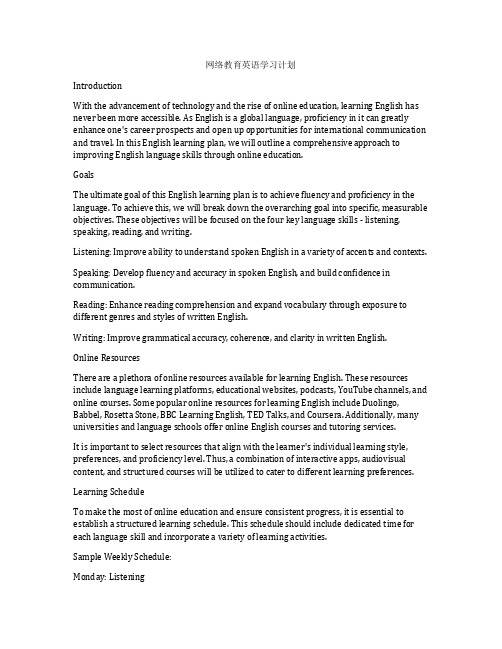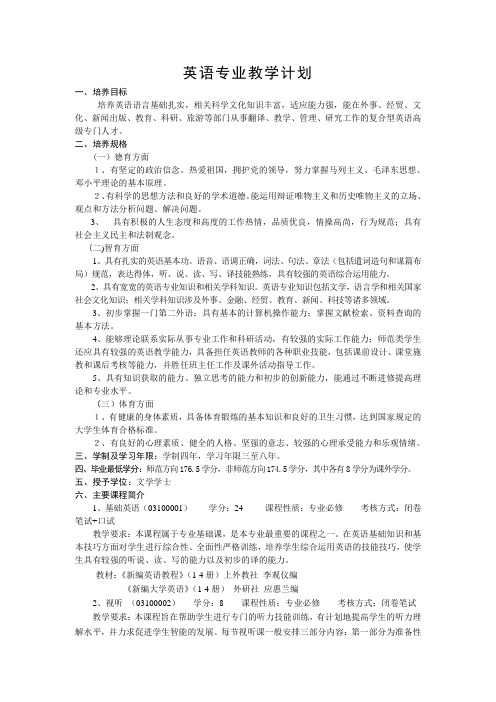郑州大学远程教育英语(本)专业教学计划
- 格式:doc
- 大小:74.00 KB
- 文档页数:2


高校远程教育工作计划高校远程教育工作计划一、工作目标与目标规划1.1 工作目标本次远程教育工作的目标是提高学生的学习质量,缓解疫情带来的影响,为学生提供更优质的在线学习体验。
1.2 目标规划(1)制定远程教育课程计划,保证课程能够按时开展。
(2)优化远程教育平台和技术,提高学生学习体验。
(3)贯彻有效的教学评估方案,确保教学质量。
(4)促进线上课程与线下课程的无缝对接,促进学生全面发展。
二、工作任务和时间安排2.1 工作任务(1)建立远程教育教务系统:建立课程在线管理、学生成绩管理、教学评价管理等功能。
(2)建设在线交互平台:建设互动平台进行线上讨论、提问交流、学生反馈等。
(3)优化教师团队:组成由技术熟练、教学经验丰富的教师团队,保证教学效果。
(4)完善远程教育课程体系和教学资源:建设线上课程,包括视频教学、知识问答、实践操作及在线测评等。
(5)开展学生考试及评价工作:实现线上考试,确保考试安全和评价准确性,提高教学质量。
2.2 时间安排(1)建立远程教育教务系统:1个月。
(2)建设在线交互平台:2个月。
(3)优化教师团队:2个月。
(4)完善远程教育课程体系和教学资源:2个月。
(5)开展学生考试及评价工作:1个月。
三、资源调配和预算计划3.1 资源调配(1)人力资源:指派专业团队进行远程教育各项工作。
(2)技术资源:购买必要的远程教育平台及设备,更新软件技术。
(3)财务资源:拨出一定财政经费,以确保远程教育工作需要。
3.2 预算计划(1)人力资源预算:100万元。
(2)技术资源预算:50万元。
(3)财务资源预算:100万元。
四、项目风险评估和管理4.1 风险评估(1)技术问题:尽可能提前发现所有技术问题,并保持稳定的技术运维,确保远程教育平台的稳定性。
(2)师资问题:教师团队的组建和配备需要精准,尽可能匹配学生需要的各方面技能和素质。
(3)学生反馈:对学生意见和反馈进行统计、分类分析,对学生需求不断调整。

一、指导思想为了提高线上英语教学质量,激发学生学习英语的兴趣,培养学生的英语实际应用能力,本学期英语线上教学工作将遵循以下指导思想:1. 突出学生主体地位,关注个体差异,因材施教;2. 注重培养学生的英语听、说、读、写能力,提高学生的英语综合素养;3. 运用现代信息技术,创新教学方法,提高线上教学质量;4. 培养学生的自主学习能力,培养学生的创新精神和实践能力。
二、教学目标1. 学生能熟练掌握英语语音、词汇、语法知识,具备一定的英语阅读和写作能力;2. 学生能在实际生活中运用英语进行简单交流,提高英语口语表达能力;3. 学生能养成自主学习、合作学习的良好习惯,培养创新精神和实践能力;4. 学生对英语学习充满兴趣,具备一定的英语学习动力。
三、教学内容与安排1. 词汇教学:每周安排5个新单词的学习,要求学生掌握单词的发音、拼写和用法;2. 语法教学:每周安排1个语法知识点,要求学生理解并掌握该知识点;3. 听力训练:每周安排2次听力练习,提高学生的听力理解能力;4. 口语训练:每周安排1次口语练习,提高学生的口语表达能力;5. 阅读理解:每周安排2篇阅读材料,提高学生的阅读理解能力;6. 写作训练:每周安排1篇写作练习,提高学生的写作能力。
四、教学方法与手段1. 线上直播教学:利用直播平台进行实时授课,与学生互动交流;2. 课堂互动:通过提问、讨论等方式,提高学生的参与度;3. 作业布置与批改:布置与教学内容相关的作业,及时批改并给予反馈;4. 课外辅导:针对学生存在的问题,进行线上个别辅导;5. 利用网络资源:推荐优质英语学习网站、APP等,丰富学生的学习资源。
五、教学评价1. 课堂表现:关注学生在课堂上的参与度、积极性,给予评价;2. 作业完成情况:根据作业完成情况,给予评价;3. 期中、期末考试:通过考试评价学生的英语综合能力;4. 学生自评与互评:鼓励学生进行自评与互评,提高自我反思能力。
六、教学进度安排1. 第一阶段(第1-4周):英语语音、词汇、语法基础知识的学习;2. 第二阶段(第5-8周):英语听力、口语、阅读、写作能力的培养;3. 第三阶段(第9-12周):英语综合能力的提升;4. 第四阶段(第13-16周):复习巩固所学知识,为考试做好准备。

一、背景分析随着科技的飞速发展,网络教育已成为一种新兴的教育模式。
在当前疫情防控的特殊时期,线上教学成为保障教育教学工作顺利进行的重要手段。
为了确保网课英语教学质量,特制定以下教学工作计划。
二、教学目标1. 确保学生在网课中能够掌握英语基础知识,提高英语听说读写能力。
2. 培养学生的自主学习能力和团队合作精神。
3. 帮助学生克服线上学习的困难,提高学习效率。
三、教学内容1. 单元单词、短语、句型讲解与练习。
2. 课文朗读、翻译、理解与分析。
3. 听力、口语、阅读、写作等技能训练。
4. 文化背景知识介绍。
四、教学方法1. 多媒体教学:充分利用PPT、视频、音频等多媒体资源,丰富教学内容,提高学生的学习兴趣。
2. 互动式教学:通过提问、讨论、角色扮演等方式,激发学生的学习积极性,提高课堂氛围。
3. 个性化教学:根据学生的个体差异,制定不同的学习计划,满足不同学生的学习需求。
4. 翻转课堂:提前布置学习任务,让学生课前预习,课堂上进行知识点的讲解与练习,提高学习效率。
五、教学步骤1. 课前准备:- 教师提前备课,制作教学课件,准备教学素材。
- 布置预习任务,让学生了解即将学习的知识点。
2. 课堂实施:- 导入新课,讲解重点难点。
- 进行课堂练习,巩固所学知识。
- 互动环节,提高学生的参与度。
- 总结归纳,帮助学生梳理知识点。
3. 课后辅导:- 通过线上答疑,解答学生的疑问。
- 布置作业,检查学生的学习效果。
- 定期进行阶段性测试,评估学生的学习进度。
六、教学评价1. 课堂表现:关注学生的出勤率、参与度、课堂表现等。
2. 作业完成情况:检查学生的作业质量,了解学生的学习情况。
3. 测试成绩:通过阶段性测试,评估学生的学习效果。
七、注意事项1. 确保网络稳定,保证线上教学顺利进行。
2. 教师要保持良好的教学态度,关注学生的学习状态。
3. 学生要按时完成学习任务,提高学习效率。
4. 家长要积极配合学校,关注孩子的学习情况。

网络教育英语学习计划IntroductionWith the advancement of technology and the rise of online education, learning English has never been more accessible. As English is a global language, proficiency in it can greatly enhance one's career prospects and open up opportunities for international communication and travel. In this English learning plan, we will outline a comprehensive approach to improving English language skills through online education.GoalsThe ultimate goal of this English learning plan is to achieve fluency and proficiency in the language. To achieve this, we will break down the overarching goal into specific, measurable objectives. These objectives will be focused on the four key language skills - listening, speaking, reading, and writing.Listening: Improve ability to understand spoken English in a variety of accents and contexts.Speaking: Develop fluency and accuracy in spoken English, and build confidence in communication.Reading: Enhance reading comprehension and expand vocabulary through exposure to different genres and styles of written English.Writing: Improve grammatical accuracy, coherence, and clarity in written English.Online ResourcesThere are a plethora of online resources available for learning English. These resources include language learning platforms, educational websites, podcasts, YouTube channels, and online courses. Some popular online resources for learning English include Duolingo, Babbel, Rosetta Stone, BBC Learning English, TED Talks, and Coursera. Additionally, many universities and language schools offer online English courses and tutoring services.It is important to select resources that align with the learner's individual learning style, preferences, and proficiency level. Thus, a combination of interactive apps, audiovisual content, and structured courses will be utilized to cater to different learning preferences.Learning ScheduleTo make the most of online education and ensure consistent progress, it is essential to establish a structured learning schedule. This schedule should include dedicated time for each language skill and incorporate a variety of learning activities.Sample Weekly Schedule:Monday: Listening- Listen to a podcast or audio lesson in English.- Practice dictation exercises to improve listening and writing skills.Tuesday: Speaking- Engage in conversation with a language exchange partner or tutor.- Record a speaking exercise and review for accuracy and fluency.Wednesday: Reading- Read a news article or short story in English.- Complete a reading comprehension exercise or vocabulary quiz.Thursday: Writing- Write a journal entry in English, focusing on grammar and clarity.- Review and edit a piece of writing, paying attention to sentence structure and coherence. Friday: Review and Practice- Review vocabulary and grammar concepts from the week.- Practice speaking, listening, reading, and writing skills through interactive exercises and quizzes.Saturday and Sunday: Flexibility- Use the weekend to revisit challenging areas or explore new topics of interest.- Participate in language exchange meetups or online discussion forums for additional practice.This sample schedule provides a balanced approach to improving all four language skills and ensures consistent exposure to the language throughout the week. It is important to tailor the schedule to fit individual commitments and availability.Language Practice and ImmersionLanguage practice and immersion play a crucial role in language acquisition. In the context of online education, there are various opportunities for language practice and immersion that can be incorporated into the learning plan.1. Language Exchange Partners: Connect with native speakers or proficient English speakers for language exchange sessions. Platforms such as Tandem, HelloTalk, and ConversationExchange facilitate language exchange partnerships with speakers of different languages.2. Virtual Language Communities: Join online communities, forums, or social media groups dedicated to language learning. These platforms provide opportunities to engage in discussions, ask questions, and receive feedback from other learners and language enthusiasts.3. Virtual Immersion: Immerse yourself in English-language content by regularly consuming English media such as movies, TV shows, music, and literature. Utilize English-language websites, news outlets, and social media for daily exposure to the language.Language Courses and TutorialsIn addition to self-study, participating in structured language courses and tutorials can greatly benefit English language learners. Online courses offered by universities, language schools, and educational platforms provide comprehensive curriculums, expert instruction, and interactive learning experiences. Some key considerations when selecting online language courses include:Course Content: Ensure that the course curriculum aligns with your learning objectives and proficiency level. Look for courses that cover all language skills and offer opportunities for practice and feedback.Instructor Support: Courses with access to qualified instructors or language tutors provide valuable guidance and feedback on language proficiency and progress.Interactive Learning: Seek out courses that incorporate interactive activities, assignments, and assessments to promote active engagement and application of language skills.Flexibility: Choose courses that offer flexibility in terms of scheduling and pacing. This allows learners to integrate the course into their existing commitments and tailor the learning experience to their individual needs.Assessment and Progress Tracking: Look for courses that include regular assessments and progress tracking tools to monitor language proficiency and identify areas for improvement. Supplementary Activities and MaterialsTo enhance the learning experience and reinforce language skills, it is beneficial to incorporate supplementary activities and materials into the English learning plan.1. Language Apps: Utilize language learning apps for quick vocabulary drills, grammar practice, and on-the-go language learning. Apps such as Anki, Quizlet, and Memrise offer flashcards, quizzes, and games for language practice.2. Online Language Challenges: Participate in language challenges or competitions to motivate and challenge yourself. Platforms like Lang-8 and 750 Words provide opportunities for daily writing practice and feedback.3. Educational YouTube Channels: Explore English language learning channels on YouTube for instructional videos, language tips, and authentic language use.4. Virtual Language Events: Attend virtual language events, webinars, and workshops hosted by language schools, cultural institutions, and language enthusiasts to gain insights and exposure to different aspects of the language.Progress Monitoring and ReflectionMonitoring progress and reflecting on the learning journey are essential components of any language learning plan. Regular assessment and reflection help identify strengths and weaknesses, track improvement, and set new goals for language proficiency.1. Language Assessments: Take regular language assessments to evaluate listening, speaking, reading, and writing proficiency. Utilize standardized tests such as TOEFL, IELTS, or Cambridge English exams, as well as online placement tests and self-assessment tools.2. Language Portfolios: Create a language portfolio to document language learning achievements, language samples, self-assessments, and feedback received. Regularly review the portfolio to track progress and identify areas for improvement.3. Journaling and Reflection: Maintain a language learning journal to record language practice, challenges encountered, and personal reflections on the learning process. Reflect on milestones, setbacks, and strategies for improvement.4. Feedback and Review: Seek feedback from language exchange partners, instructors, or language communities, and use it to adjust learning strategies and goals. Regularly review progress and adjust the learning plan as needed.Adjusting the PlanAs language learning is a dynamic and personal process, it is important to be flexible and adaptable in the approach. Regularly assess the effectiveness of the learning plan and make adjustments based on individual learning needs, interests, and progress. Be open to exploring new resources, techniques, and opportunities for language practice and immersion.ConclusionIn conclusion, online education offers a wealth of opportunities for English language learners to develop fluency and proficiency in the language. By incorporating a variety of online resources, structured learning activities, language practice and immersion, and assessment and reflection into the learning plan, learners can make significant strides in improving their English language skills. Consistent effort, dedication, and adaptability are key to making the most of online education for English language learning.。

英语专业教学计划一、培养目标培养英语语言基础扎实,相关科学文化知识丰富,适应能力强,能在外事、经贸、文化、新闻出版、教育、科研、旅游等部门从事翻译、教学、管理、研究工作的复合型英语高级专门人才。
二、培养规格(一)德育方面1、有坚定的政治信念。
热爱祖国,拥护党的领导,努力掌握马列主义、毛泽东思想、邓小平理论的基本原理。
2、有科学的思想方法和良好的学术道德。
能运用辩证唯物主义和历史唯物主义的立场、观点和方法分析问题、解决问题。
3、具有积极的人生态度和高度的工作热情,品质优良,情操高尚,行为规范;具有社会主义民主和法制观念。
(二)智育方面1、具有扎实的英语基本功。
语音、语调正确,词法、句法、章法(包括遣词造句和谋篇布局)规范,表达得体,听、说、读、写、译技能熟练,具有较强的英语综合运用能力。
2、具有宽宽的英语专业知识和相关学科知识。
英语专业知识包括文学,语言学和相关国家社会文化知识;相关学科知识涉及外事、金融、经贸、教育、新闻、科技等诸多领域。
3、初步掌握一门第二外语;具有基本的计算机操作能力;掌握文献检索、资料查询的基本方法。
4、能够理论联系实际从事专业工作和科研活动,有较强的实际工作能力;师范类学生还应具有较强的英语教学能力,具备担任英语教师的各种职业技能,包括课前设计、课堂施教和课后考核等能力,并胜任班主任工作及课外活动指导工作。
5、具有知识获取的能力、独立思考的能力和初步的创新能力,能通过不断进修提高理论和专业水平。
(三)体育方面1、有健康的身体素质,具备体育锻炼的基本知识和良好的卫生习惯,达到国家规定的大学生体育合格标准。
2、有良好的心理素质、健全的人格、坚强的意志、较强的心理承受能力和乐观情绪。
三、学制及学习年限:学制四年,学习年限三至八年。
四、毕业最低学分:师范方向176.5学分,非师范方向174.5学分,其中各有8学分为课外学分。
五、授予学位:文学学士六、主要课程简介1、基础英语(03100001)学分:24 课程性质:专业必修考核方式:闭卷笔试+口试教学要求:本课程属于专业基础课,是本专业最重要的课程之一。
远程教育学习计划(汇总3篇)1.远程教育学习计划第1篇为适应新时期教育教学工作的需要,进一步提高自身的教育技术能力和教学实效,特制定本期的远程教育学习计划如下:一、学习心态有好的心态是做好事情的开始,因此我先要调整好心态,周一至周五每天工作八小时内,努力把工作做好并完成,以保证工坐业余时间有个放松的心情在网上去学习,这样才能学好东西。
二、学习目标在有效的时间内全部完成课程和教育理论等内容,并一次性过考试要求。
在这过程中我会把目标分解成短期目标,然后再对短期目标进行阶段性重点主功,以达到实现为目的。
三、本学期学习内容1、公共必修课2、专业必修课四、学习形式由于网络教育的教学形式是:教材自学+课件学习+网上导学+网上答疑讨论+学习包+课程作业+学习中心导学辅导。
所以我大部分时间会选择网络在线学习自主学习,遇到疑难问题上网查找资料、和同学讨论。
五、学习时间讲到时间这个问题,作为学习和工作并兼的我,时间是固然紧张的,但是只要去安排,也是能有大量空佘时间的。
1、周一至周五每天5点半到7点学习一个半小时。
2、周六周日每天抽5到6个小时学习。
3、寒暑假利用每天(抽时间)学习5、6个小时。
4、利用“郑州大学远程教育”的网络资源,每周至少上网学习4—5次。
5、每天阅读郑师大发放的每门课程的书籍一小时。
6、每天利用半小时时间,阅读当天报纸杂志,了解国内外的重大新闻、政策形势、提高自己的政策理论水平。
六、学习措施1、每周坚持上网学习,及时解决学习中遇到的困难。
2、制订学习时间表,张贴在家中,让同事和家人见证、监督自己的学习。
3、定期完成远程教育布臵的作业。
七、学习原则1、循序渐进,持之以恒,不能“三天打鱼两天晒网”。
2、统筹兼顾,科学安排。
处理好学习与工作的关系,做到学习与工作有机统一,努力使学习工作化,工作学习化。
3、融会贯通,学以致用。
通过不断学习业务知识来提高自己的业务水平,通过不断实践来丰富工作经验,把知识和经验的积累升华为思维模式的更新,进而转化为工作创新的源泉和动力。
远程教育教学计划工作目标1.远程教育教学内容的深度整合与优化针对现有的远程教学内容,进行深度整合与优化,确保教学内容的质量与吸引力。
这包括对教学内容的逻辑结构、知识点覆盖、案例选取等方面进行全面的审查与调整,以适应不同学生的学习需求和提高教学效果。
具体而言,需要组织一批经验丰富的教育专家和教师,对现有教学内容进行全面的评估和梳理。
针对不同学科和课程的特点,设计合理的教学大纲和教学计划,确保教学内容的科学性和系统性。
同时,也需要注重教学内容的实用性和时代性,及时更新教学内容,引入最新的科研成果和行业动态。
2.提升远程教学的互动性和参与度通过技术手段和创新的教学方式,提升远程教学的互动性和参与度,使学生能够更加积极地参与到学习过程中。
这包括开发互动性强的教学工具和平台,设计有趣的学习活动和任务,以及建立有效的师生沟通和反馈机制。
具体而言,可以利用在线讨论区、虚拟实验室、在线问答系统等技术手段,为学生提供更多的互动和学习机会。
同时,也可以设计一些团队项目、在线竞赛等活动,激发学生的学习兴趣和竞争意识。
此外,还需要建立一套有效的师生沟通和反馈机制,及时了解学生的学习情况和需求,为学生提供个性化的指导和帮助。
3.建立完善的远程教育教学评估体系建立完善的远程教育教学评估体系,对教学质量进行全面的监控和评估,以确保教学目标的实现。
这包括制定科学的教学评估标准和方法,建立有效的教学质量监控机制,以及定期进行教学质量的评估和反馈。
具体而言,需要制定一套全面的教学评估标准,包括教学内容、教学方法、教学效果等方面。
同时,也需要建立一套有效的教学质量监控机制,包括定期的教学质量检查、学生反馈收集等。
此外,还需要定期进行教学质量的评估和反馈,及时发现和解决问题,提高教学质量。
工作任务1.远程教育教学内容的审查与优化组织一批经验丰富的教育专家和教师,对现有远程教学内容进行全面的审查和优化。
这包括对教学内容的逻辑结构、知识点覆盖、案例选取等方面进行全面的审视和调整,以适应不同学生的学习需求和提高教学效果。
郑州大学现代远程教育招生简章
郑州大学是河南省惟一的国家"211工程"重点建设高校,是河南省人民政府与国家教育部共建高校,是一所涵盖理学、工学、医学、文学、历史学、哲学、法学、经济学、管理学、教育学、农学、艺术学等12大学科门类的综合性大学,学校师资力量雄厚,办学条件优越。
2002年2月,经教育部批准为国家开展现代远程教育试点学校。
现采取自主招生的方式,面向社会招收现代远程教育本、专科层次的学历教育学生。
一、招生对象及报名条件
1.招生对象:各级各类行政干部、国家公务员、教师、其他行业的在职从业人员、社会青年、待业人员等;
2.报考专科起点本科,须具有国民教育系列专科或专科以上学历;报考高中起点专科,应具有高中(含职高)、中专学历或同等学历;
3.报考医学类相关专业的考生必须是已取得卫生类职业资格的在职人员,报名时考生需携带卫生类职业资格证或初级以上( 含初级)卫生类职称证原件和复印件;
4.报考护理学专科的考生,须持有护理学中专毕业证或护士证。
招生专业、层次、学习年限、学分及入学考试科目
内容整理自学校官网!。